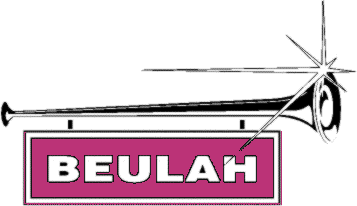|
|
Beulah quoted
"These
are careful transfers which make the most of the material, whereas I
suspect that some others just stick an LP or 78s on the turntable and
give us what comes out the other end. Beulah’s results are comparable
with the fine transfers which Naxos Historical offer. " Brian
Wilson at Music Web International
"The
Beulah
record label has always been one of the most idiosyncratic, and
therefore perhaps most interesting, of reissue marques. While the basic
character of Beulah remains the same as in its Compact Disc days, the
range of its present catalogue, driven now by the ease of downloading,
has been extended in remarkable fashion. Browsing the Beulah catalogue
is now rather like being in a 78rpm record shop: there are plenty of
recordings of short pieces available to whet your appetite for either
repertoire or artist, while at the same time there are numerous full
length works available if you wish to consolidate your collection with,
for instance, major symphonies. All of Beulah's transfers, as might be
expected of a distinguished reissue label, are of very high quality."
David Patmore writing in Classical
Recordings Quarterly
"Beulah
releases are available from other
suppliers but  offer them in
lossless sound" Brian
Wilson at Music Web International offer them in
lossless sound" Brian
Wilson at Music Web International
Reviewer's Recommendations
David McDade's review of Twentieth Centrury Classics
Volume 5
"
It would seem inevitable that a label like Beulah was going to be drawn
to the classic recordings from the Mercury label which have a claim to
be some of the finest of the LP era. The selection of works on this new
Beulah release straddles two different Mercury LPs and it demonstrates
just how adventurous their recorded repertoire could be.
" Kubelik, a composer himself, had a fine pedigree in the music of his
century, a fact sometimes obscured by his recorded legacy being
dominated by nineteenth century composers. The casual listener will not
be surprised at how good his Mozart with Curzon or his Beethoven with
Serkin is but may be surprised to learn just how good a foil he
provided for Alfred Brendel in Schoenberg’s thorny piano concerto. It
is worth pointing out that the story goes that he was forced out of the
Chicago job on account of performing too many modern scores.
"An interesting point of comparison is between this Music for Strings,
Percussion and Celesta and the more celebrated later recording with the
same orchestra by Fritz Reiner. They could hardly be more different.
Reiner, the Hungarian, is more hard edged, rhythms driven and ensemble
so sharp you could cut yourself on it. The Czech, Kubelik, is more
concerned with atmosphere and sounds the more Hungarian of the two. An
oversimplification admittedly but there is something in seeing Reiner
as the modernist and Kubelik as sticking closely to the folk music
roots of this music. Reiner’s is, rightfully, considered one of the
greatest recordings of all time but the surprise is how little ground
this Kubelik version has to concede to it.
"The Bartók is positively populist compared to the other two works that
make up the programme. The Bloch is a real rarity. Written in 1925, it
has suffered the neglect that has been the fate of a lot of the then
fashionable taste for the neoclassical. It is a likeable, warm hearted
work.
"Kubelik always had a special way of coaxing a unique sound from the
strings and he is at his wizardly best in the Bloch. What could be dull
slabs of string chord work resonate with trenchant intensity, each part
clearly audible yet seamlessly integrated. "
"Beulah save the best for last with an absolutely stupefyingly good
version of the Schoenberg Op16. This work represents in many ways one
of the high points of the composer’s expressionist phase before the
development of the 12 tone system....Even in the good but necessarily
limited sound of this 1953 recording, the colours glow in all their
menacing wonder. The way Kubelik maintains the febrile climate across
five very different pieces is a remarkable achievement and the
precision of the playing matches him at every step.
"It is often the case that recordings that always sounded good respond
best to attempts at sonic restoration and so it is here. Mercury were
always an audiophile label and the results of their approach sound
surprisingly modern to my ears. Beulah’s love affair with this classic
era of the LP continues with this release. For all the famously stated
desire to capture the ‘living presence’ of the orchestra what I hear is
the experience of listening to an album on a turntable with everything
possible being done to maximise that experience. Given this view of
these albums, Beulah’s methods seem particularly appropriate.
"Do have a listen to these stunning performances."
Read the
full review.
New for July
Many music lovers miss the sound
from vinyl pressings.
Many others have yet to discover how great the sound can be.
Most of our albums are mastered from vinyl LP pressings and earlier
recordings (generally before 1953) from 78 rpm discs. It is our ability
to
recreate, in the digital age, the sound from the disc era that many of
our customers find most enjoyable.
Unlike modern digital recordings
tracks in our
albums do contain some distortion, and the occasional surface noises,
but for many listeners these "defects" are soon forgotten.
Our albums are available from
many download and
streaming sites.
|
Thirty Years Of Beulah
To
mark our thirtieth
anniversary, each month we will feature
here an album from our back catalogue.
July
Beulah does have a
representative collection of cinema and theatre organs among its
releases.
Listen to Cinema Organ Favourites
June
Ever popular is Glenn
Miller. We have, across 13 albums, produced over 250 tracks of this
famous band recorded between 1938 and 1944. The albums are all listed
on our Jazz page
Listen to Glenn
Miller
playing "Be Happy"
May
Although the first Beulah
releases did not appear until July 1993, Beualh was created at meeting
held in May 1993 at audio post production house, Chop Em Out in London
W10. Attending the meeting were Bernie Spratt and Simon Heyworth
representing Chop em Out, Malcolm Walker former editor of The
Gramophone, David Michell an avid collector of 78 rpm records and Barry
Coward, proprietor of Film Archive Management and Entertainment (FAME).
The outcome of this meeting
was that Beulah operated from FAME's base located in Henderson's Film
Laboratory in South Norwood. On 4 July 1993 a devastating fire at the
laboratory resulted in the loss of original negatives of feature films,
notably from Ealing Studios. However Beulah was located on the top
floor
where the damage was from water emitted from fire hoses, so we carried
on
with the planned lauch of Beulah.
In May 1937 the Coronation of
King George VI was held and the Coronation Aldershot Tattoo that
year featured an epligue that paid homage to the new King. In 2020 we
published an album of recordings made on the Rushmore Arena of the
Tattoos from 1932 to1938. These events featured over 1,000 bandsmen.
|
2PD9
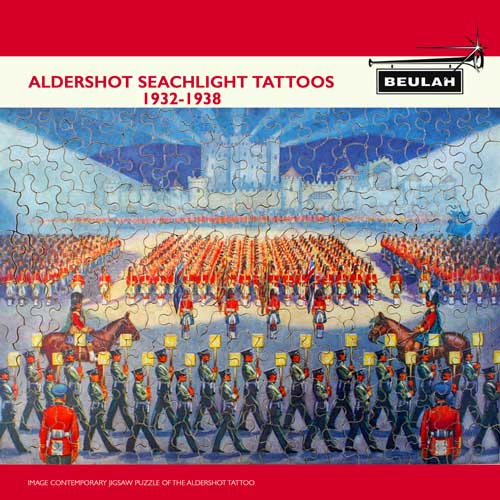 |
Live recordings made at the annual Aldershot
Military Tattoos 1932-8
|



|
April
We feature British Jazz and Blues
in our series entiteld Jazz
Britannica.
Here
extracts from the
first volume featuring Alexis Corner,
George Mely, Cleo Laine
Go to our Jazz page for all our jazz
albums
March
In time for Alfred Brendel's 90th
birthday we issued three albums of his early recordings. David McDade
reveiwed all three albums. Here is an extract from his review of
Volume 2
"A first glance at the listing on
this second volume of Beulah’s series of the early recordings by Alfred
Brendel would suggest we are in very unfamiliar territory in terms of
the great Austrian pianist’s usual repertoire.
"It turns out that Mussorgsky’s
collection of curios and grand visions,
based on similarly offbeat paintings by Hartmann, suits Brendel to a
tee. "
"Beulah’s sound throughout
elegantly walks a tightrope between, on the one hand, bright but
brittle and, on the other, resonant but cavernous and booming. In the
Mussorgsky in particular, astonishingly, they find a natural sounding
ambience in which the piano sound sits, which gives proceedings a real
presence. Brendel’s distinctive almost staccato sound is a hard one for
remastering to get right and I think Beulah get it just about spot on."
Read the
full review.
Hear
"The Great Gate of Kiev"
|
2PS86
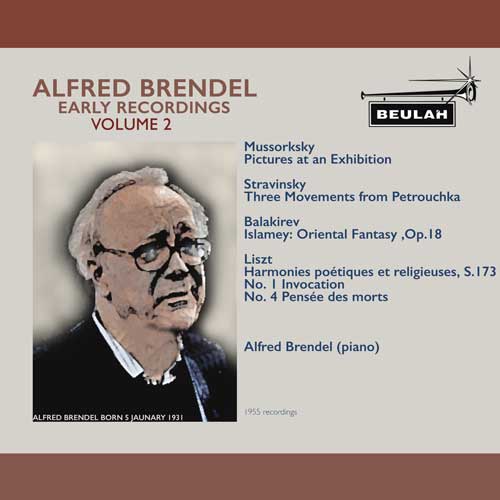 |
Alfred Brendel Early Years 2
Mussorgsky Pictures at an Exhibition
Stravinsky Three Movements from Petroucka
Balakirev Islamey
Liszt Harmonies poetiques et religieuses No 1 and No.4
|





|
February
Decca,
in the LP era, was famed
for its sound. Our album of George Szell conducting Brahms has good
examples of the Decca sound with the Piano Concerto recordred in stereo
in London's Kingsway Hall and the Symphony recorded in mono in the
Concertgebouw, Amsterdam.
Szell
was a perfectionist
and
Curzon was a mercurial pianist. Ken Wilkinson's balance in both
recordings is a revelation. In both venues Wilkinsion had the orchestra
located in the body of the hall rather than on the platform.
Hear
extracts from both
perfomances
|
1PS95
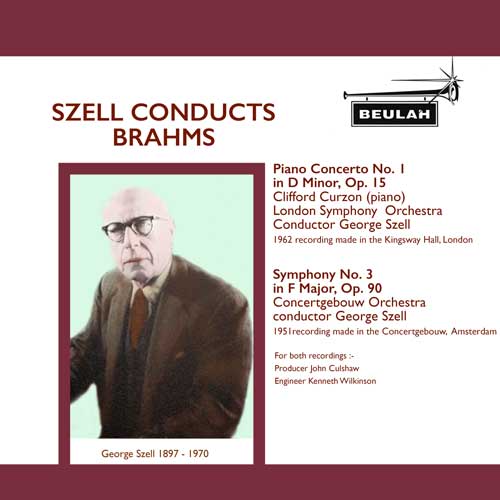 |
Szell Conducts Brahms
Piano Concerto No.1 in D minor Op. 15 with Clifford Curzon
Symphony No.3 in F Major, Op.90
|




|
January
The first Beulah releases
centred
on recordings made in
London's Crystal Palace. The Crystal Palace, located at the top of
Sydenham Hill, had an auditorium that could seat 60,000 people and
accomodtate a choir and orchestra of 3,000.
From 1900 until the building
was destroyed by fire in November 1936 it was the venue for the
National
Brass Band Championships sponsored by railway compaines.
The final event took place just a month before the fatal fire.
Hear
a truncated version
of the
William Tell Oveture from our Brass
at The Crystal Palace album.
|
2PD2
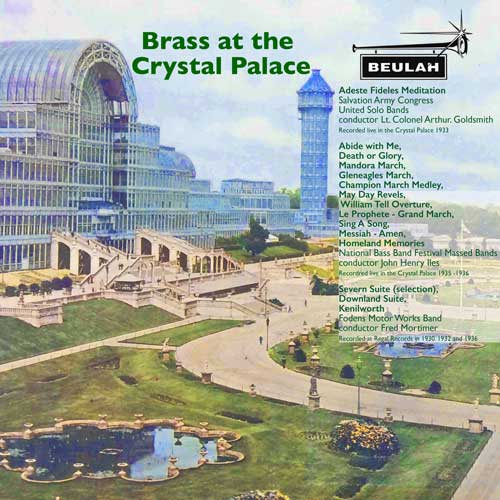 |
Brass at the Crystal Palace Champions
All the brass band tracks recorded in the Crystal Palace originally
relased on 1PD1 and 1PD2.
Adesta Fideles Meditation, Abide With Me, Death
or Glory, Mandora March, Gleneagles March, Champion Medley Nos 1,2 and
3, May Day Revels, William Tell Overture, Sing a Song, Le
prophete Grand March, Messiah Amen, Severn Suite, Downland Suite,
Kenilworth
|





|
|
